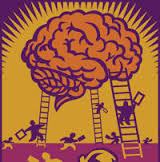Sorry to let you down Google. It’s not so fancy, or so easy. This post is all about the roles of a researcher. My blog will clearly be biased to what I do, but some of these elements can safely be generalized to most cognitive researchers.
Being a researcher, is a lot like being a parent. I guess. As a parent, you probably to a lot of thinking, managing, thinking, worrying, and play a number of roles – cook, driver, cleaner, teacher, safety guard, etc. Cognitive research also has a lot of roles, and each involves tons of mini jobs!
The Avid Reader
Yes, as a part of our job, we need to read. A lot. And understand. A lot. No, it’s not like Hobby-reading. Yes, we need to be up to date with all the scientific trends.
The Penseur (Thinker) Ok, cognitive/behavioral/neuropsych sciences don’t involve the kind of thinking humanities and social sciences does, and we are definitely not the philosopher this statue represents, but there is a lot to think about anyways.I mean, what else would we do after all that reading?
Ok, cognitive/behavioral/neuropsych sciences don’t involve the kind of thinking humanities and social sciences does, and we are definitely not the philosopher this statue represents, but there is a lot to think about anyways.I mean, what else would we do after all that reading?
Unless you do the kind of research Amy Farrah Fowler does, and cut open the brain, your inferences need to be well thought of. For that, your design needs to be well thought of. And at every phase of research, all the previously thought of points need to be implemented – this is its own kind of thinking.
The Programmer
Programming and statistics are always steep learning curves. Again, its just like becoming a parent. You just having a crying, pooping baby now, and you need to figure out what it needs to function. Sure, you have books on it, but none of the books are really written on your particular baby. Just functioning of babies in general. Most psychologists don’t get programming experience. Most undergraduate courses completely ignore it, masters programs ignore it unless you specialize in something research-y, and by PhD its all ‘you don’t know how to program’? Don’t worry if you are at that stage. You will be a pro by the end of your first year. Or your baby will die. Nonetheless, there will always be that one expert in your research group whose only job is to help out other stuck psychology researchers. Typically a physicist or a statistician. If you are doing a PhD like mine and don’t have this guy – find him! (Psss – Software forums are not as helpful as you’d like them to be).
The Technician
Something else I needed to do for my study was a whole lot of hardware for 2 different set-ups! Translation – lots of fancy equipment, wires, some not so fancy stuff connecting all this. Everyone needs to know how the hardware works and what could disrupt your temporal precision (down to milliseconds) or spacial precision (knowing which brain region is doing what). Sometimes just knowing this is enough. Sometimes you need to fix it. Sometimes (like me) you need to build it from scratch. This is easier if you have a good technician around. He will help you, but again, research set-ups are not a part of a typical engineering program. So you need to know what your baby needs. Does it need a special kind of diet? Is it allergic to specific set-ups?
Ok, the parent analogy is stretching a bit. Lets give it a rest! (Mental note – do not use metaphors you have no experience with!)
The Sales Rep
Then there is the whole bit of the actual testing. Once everything is up and running, and before you get lost into what your data actually means, you need to get people (participants) willing to participate in your study. Then you test them on the tasks you already programmed and the equipment you fixed. This process needs to be done over and over, depending on how many people you can test and how many people your lab can test at once.
The Job-Jumper
Everything you did not expect to be doing in the fancy world of research. It doesn’t last long, it doesn’t deserve its own job-title, but it needs to be done. Creating stimuli, re-sizing images, ordering chairs, moving tables, copy pasting raw data for days. If you can delegate these tasks, you will be surprised at how much time you can save! You would even have time to write a blog then!
The Data Analyst
Finallyyyyy, you lock yourself in front of that computer with numbers and make sense of your data before writing it up. This phase goes hand in hand with the testing phase and also involves tons of discussions (typically with your supervisor, collaborators, and colleagues) to make sense of what you find.
The Writer
Just a line on this since I am not in my writing phase yet! 😀 It can be torture. Just like writing a book. Draft after draft till every word in it is exactly what you want it to be.
The Executive Function (EF)
Hehe…quick psych reference – the EF is a part of Working Memory. It’s only job is to decide what the rest of the working memory would be doing. (Title courtesy – my supervisor) Just like the parent playing multiple roles, managing the many aspects is sometimes the most difficult thing in research. You may have people you can go to for help, articles that you can read to understand things, interns who can help with testings, colleagues and superiors that discuss everything with you. But…while there is a ton of stuff you need to do on your own, there is also a ton of stuff you need to interact with people for. So in a week where you have 6 testings, but also need to send analysis to your collaborator, a draft to your supervisor and your intern/masters student has a breakdown that they don’t understand statistics…what do you do? What do you delegate? What do you prioritize? When do you do the learning, and when do you do ‘work’?
Just like the parent playing multiple roles, managing the many aspects is sometimes the most difficult thing in research. You may have people you can go to for help, articles that you can read to understand things, interns who can help with testings, colleagues and superiors that discuss everything with you. But…while there is a ton of stuff you need to do on your own, there is also a ton of stuff you need to interact with people for. So in a week where you have 6 testings, but also need to send analysis to your collaborator, a draft to your supervisor and your intern/masters student has a breakdown that they don’t understand statistics…what do you do? What do you delegate? What do you prioritize? When do you do the learning, and when do you do ‘work’?
To give you an idea of how grave this problem is, let me point out, that the department at my university responsible for Doctoral candidates ran 18 workshops this semester, JUST on ‘Management and Communication’. I actually see this number gradually rising every semester.
So yea…I guess this sums up most research jobs, but lets not forget, you may want to do other project like teach elsewhere or do counseling/therapy sessions and this also needs to be incorporated along with your doctorate. And we haven’t even began speaking about personal life. A lot of PhDs think there isn’t such a think as personal life any more, but I disagree. A topic for another post I guess.

